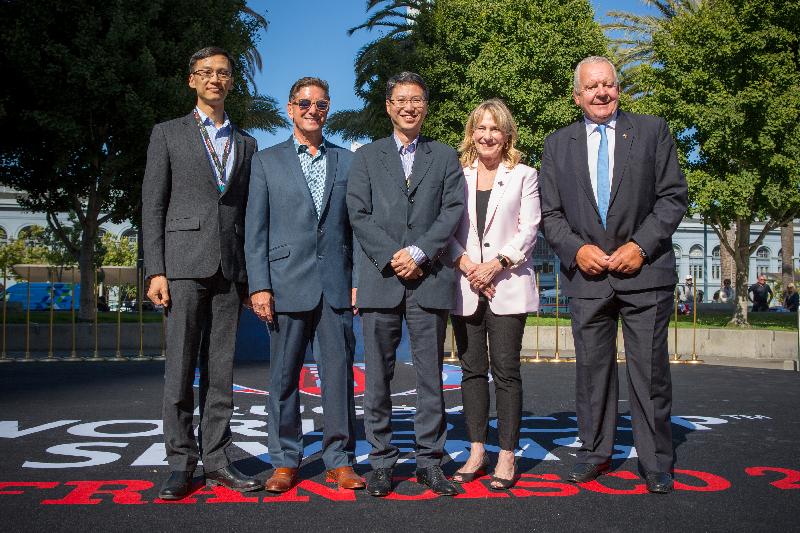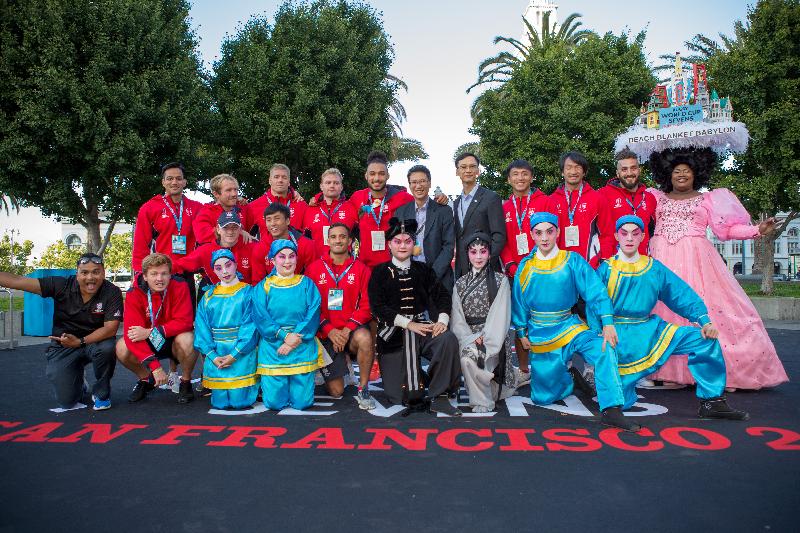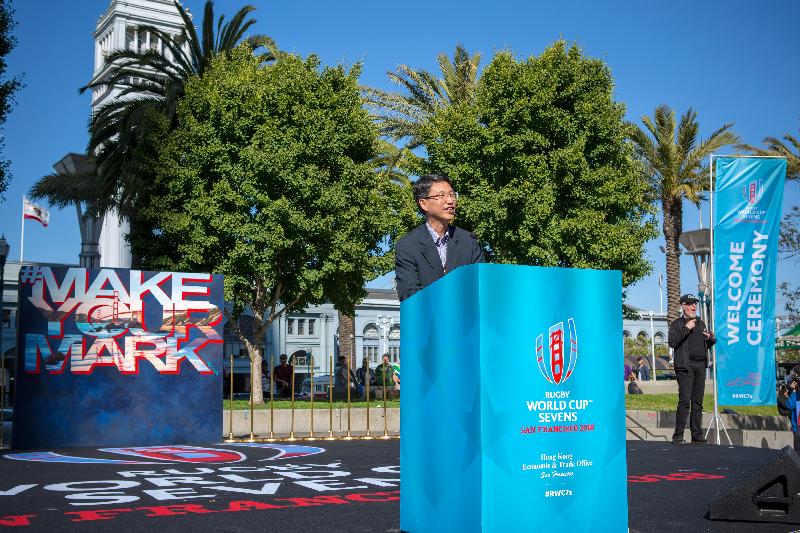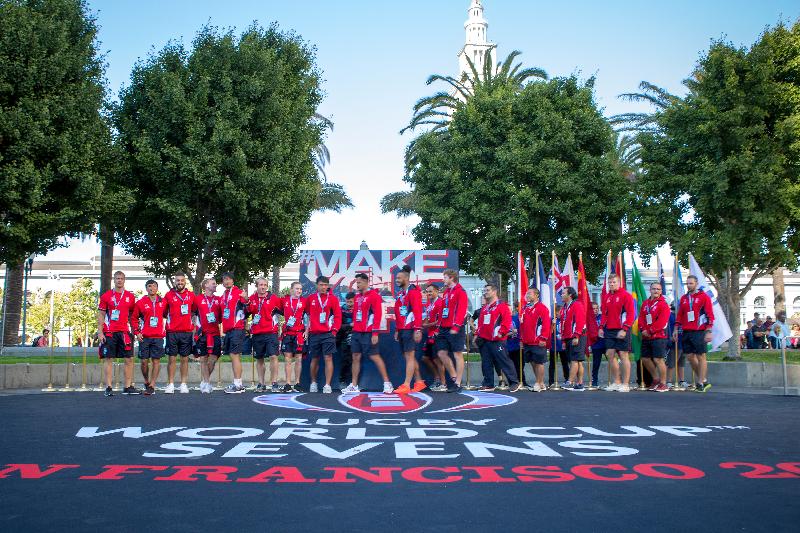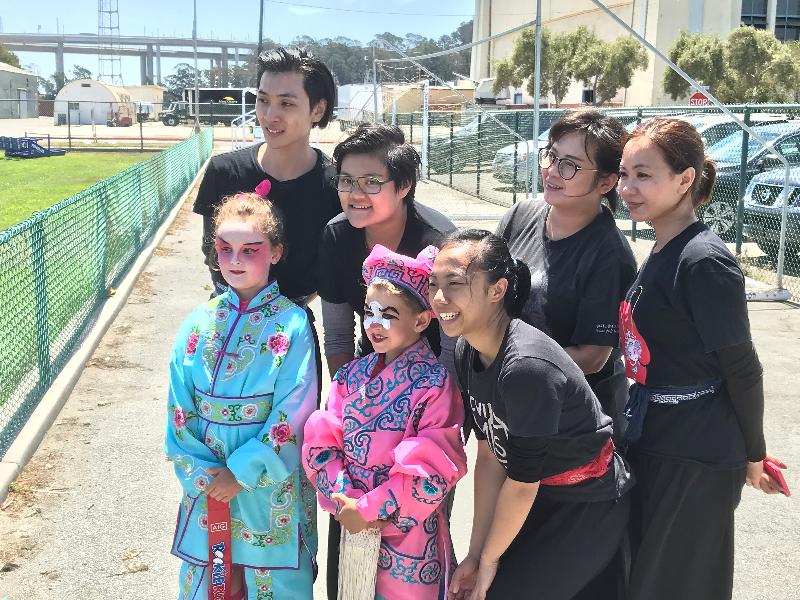Thousands of people attended the Nations Welcome Ceremony hosted by the Rugby World Cup Sevens 2018 today (July 19, San Francisco time) at the Embarcadero Plaza in San Francisco, the United States, to kick off the tournament weekend. The ceremony was presented by the Hong Kong Economic and Trade Office, San Francisco.
This is the first Rugby World Cup Sevens to be held on American soil and it will be played at San Francisco’s AT&T Park starting tomorrow (July 20, San Francisco time).
Today’s ceremony welcomed the 24 men’s teams and 16 women’s teams from around the world. The competing teams from Argentina, Australia, Brazil, Canada, Chile, China, England, Fiji, France, Hong Kong, Ireland, Jamaica, Japan, Kenya, Mexico, New Zealand, Papua New Guinea, Russia, Samoa, Scotland, South Africa, Spain, Tonga, Uganda, Uruguay, the United States, Wales and Zimbabwe all went up on stage alongside a special mural art piece which will be displayed throughout the tournament.
Speaking at the ceremony were the Chairman of World Rugby, Mr Bill Beaumont; the Chairman of the Board, USA Rugby, Ms Barbara O’Brien; the Hong Kong Commissioner for Economic and Trade Affairs, USA, Mr Eddie Mak; and the President and CEO of San Francisco Travel, Mr Joe D’Alessandro.
Mr Mak, who assumed the post of Hong Kong Commissioner for Economic and Trade Affairs, USA in early July, said he was pleased to make his first official visit to San Francisco and greet the rugby players from around the globe.
“The Hong Kong Economic and Trade Office in San Francisco proudly presents today’s programme to welcome the competing teams,” said Mr Mak. “Rugby is entrenched in Hong Kong’s sporting culture. The sevens really got under way in Hong Kong in 1976 with 12 teams playing to 3 000 people. In April, we hosted the three-day Hong Kong Sevens which featured 40 international teams playing to 120 000 enthusiastic fans.
“Global sports fans are enjoying a feverish summer. Just as the FIFA World Cup concludes we are gearing up for the Rugby World Cup Sevens. Sports fans would be right at home in Hong Kong as we enjoy a full sports calendar every year. Many international sporting events – from marathons and equestrian events to the E-Prix and regattas – take place in Hong Kong. We are fully committed to being the premier sports venue in Asia. We hope you will all come to Hong Kong to join us for some of our sports events.”
Today’s ceremony opened with a special performance by a cast member of San Francisco’s famous Beach Blanket Babylon musical revue, and concluded with a Cantonese opera act performed by an opera troupe from Hong Kong.
In addition to their stage performance, the Cantonese opera troupe also prepared four costumes for the public to try on in the costume tent. Many took the opportunity to take photos while wearing these colourful costumes.
Earlier in the week, the Cantonese opera troupe participated in community events leading up to the Rugby World Cup Sevens, including talks and demonstrations of this traditional art form for local youths.
“We are pleased to bring the Cantonese opera troupe from Hong Kong to participate in the welcome ceremony and cultural exchange activities. This is a great opportunity to showcase this traditional art form to San Francisco Bay Area audiences and youths,” the Director of the Hong Kong Economic and Trade Office, San Francisco, Mr Ivanhoe Chang, said. Cantonese opera was officially inscribed in UNESCO’s Representative List of the Intangible Cultural Heritage of Humanity in 2009. For those who want to learn more about this cherished art, Mr Chang encouraged them to visit the Xiqu Centre in Hong Kong, which is due to open in the brand new West Kowloon Cultural District later this year.
read more


